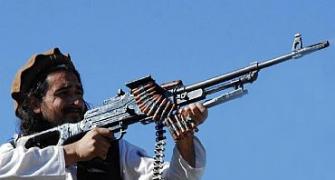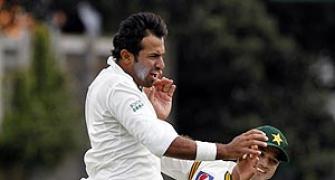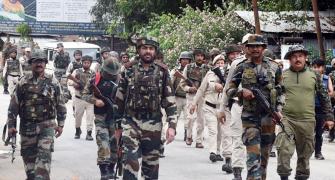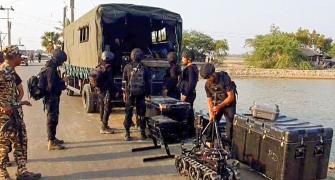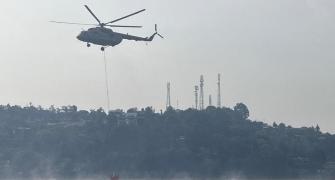In a scathing indictment of Pakistan's perfidy in the US-led war on terror in Afghanistan, the former Director of the Afghan National Security Directorate, Amrullah Saleh asserted that since 9/11 the Pakistani military has continued to direct, fund and protect the Afghan Taliban.
Saleh, who was keynoting a conference session on Security in Afghanistan hosted by the Jamestown Foundation at the National Press Club in Washington also said that the United States has acknowledged and it's well known in intelligence circles that the Lakshar-e-Tayiba is the "creation of the Pakistani military establishment, that the ISI was involved in the Mumbai terror attacks, the LeT is working with Al Qaeda, and Ilyas Kashmiri is now an important operative for the Al Qaeda."
"We talk about all these proxies, but not the master of proxies, which is the Pakistani army," he said.
Saleh argued that "in 2001-2002, the Taliban were not entirely defeated. They were pushed out of Afghanistan. They had lost territory, and they had lost command and control and they had lost their fighting machine. But as far as the leadership of the Taliban were concerned, they had gone to Pakistan where they were protected by the Pakistani military in the tribal areas."
Saleh said the US Af-Pak strategic review had a number of problems, with the most fundamental being that "in the current strategy, the United States still believes Pakistan is honest--or at least more than 50 percent honest."
Referring to statements and interviews by senior Pentagon officials including the likes of US Defense Secretary Robert Gates that "rogue elements" in the Pakistani military and ISI may be still keeping their options open by supporting elements of the Taliban so that Islamabad would still have influence in Afghanistan if the US abandons them like it did following the erstwhile Soviet Union's withdrawal more than 20 years ago, Saleh said he was aghast at such statements that almost implied a justification for Pakistan's support for the Taliban.
But Saleh asserted that "even if the United States does not remain in Afghanistan forever, does that justify Pakistan to grow and create these militants groups? I believe not."
He reiterated that nothing has changed in Pakistan with regard to "the double-game" it is playing with the US and taking Washington for a ride while receiving the massive military and economic largesse. "Have we captured, killed, or brought the Taliban leadership to the negotiating table? Have we defeated the Al Qaeda? No. So, while the (US troop) surge has brought a temporary effect, the Afghan security forces are not capable of holding the ground that the US troops have cleared today for us."
Saleh said that this was because Afghanistan would always have to reckon with the Pakistani military-sponsored, armed, and directed Afghan Taliban. "The basics have not changedthe same Al Qaeda, the same Taliban, the same deceptive Pakistan, the same global agenda for the jihadist groups remain."
He said he was not against
Saleh spoke of this same fate that had befallen the former resistance movement, the Northern Alliance, which had been backed by India. "They were demobilized, disarmed and reintegrated. They did not surrender to a faction. They surrendered themselves to the rule of law, to the democratic process, and a lot of them are now marginalised politically. But they gave up their weapons."
Thus, he argued that unless this process were followed with the Taliban, and "without pushing them to declare who their commanders are, what is their list, a deal will be a disaster both for Afghanistan and for the United States."
Saleh's distaste for the Pakistani military and the ISI was palpable and he kept returning to it both in his opening remarks and the question and answer session.
"The question is what does the Pakistan army want to achieve, by saying to Washington, we are the victims," he asked, even as "going back to Rawalpindi they are the masters of all these proxy operations," be it the LeT, the Afghan Taliban or Al Qaeda."
Saleh pointed out that "you continue to hear the news about suffering of people in tribal areas but the establishment is not shocked. But one bomb blast in Rawalpindi or an inner city of Pakistan, that's what they take seriously. So, Pakistan believes that by promoting these proxy groups, even if there is a leakage, even if there is a spillover, it will be like a fire in the servants quarters. It will not burn the main palace. That is their theory."
Saleh said for the Pakistan military establishment and the government, "the tribal areas is like the servants quarters, even if it continues to burn forever."
Continuing to pillory the US strategy, the former senior Afghan security official said, "Now, what we don't see clearly is a US strategy--a consistent policy--towards the fundamental issue, Pakistan. It's a country, which despite your protest, despite the threat of sanctions, and despite the one-time sanctions, they indulged in proliferation. It's a country, which promised to you, trust us, believe us, 9/11 has changed us, but they have not changed."
Saleh said, unfortunately, "The United States believes that by giving more money, more resources to Pakistan, you can convert their behavior from bad to good. But it's rewarding bad behavior, which keeps them to continue to have that bad behavior."
He said from September 12, 2001, "Pakistan is providing only retail cooperation to the United States. You have not earned the wholesale cooperation from that country."

